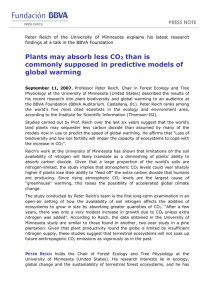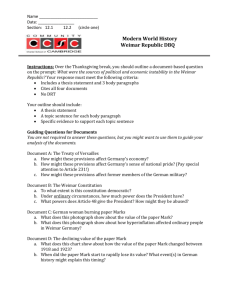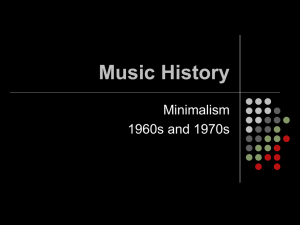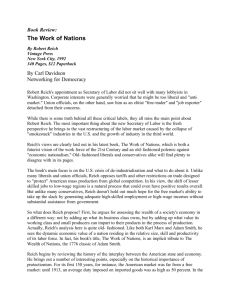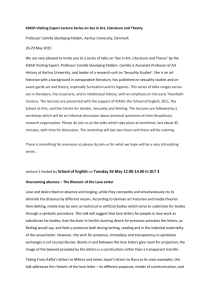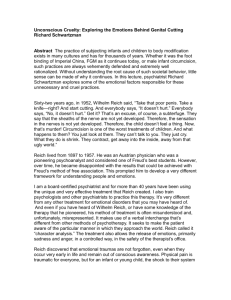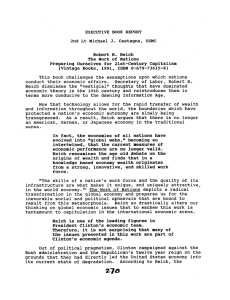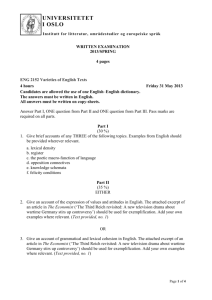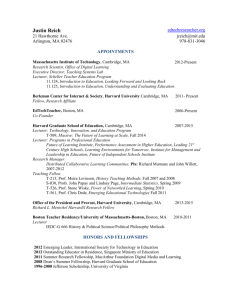reich_1992
advertisement
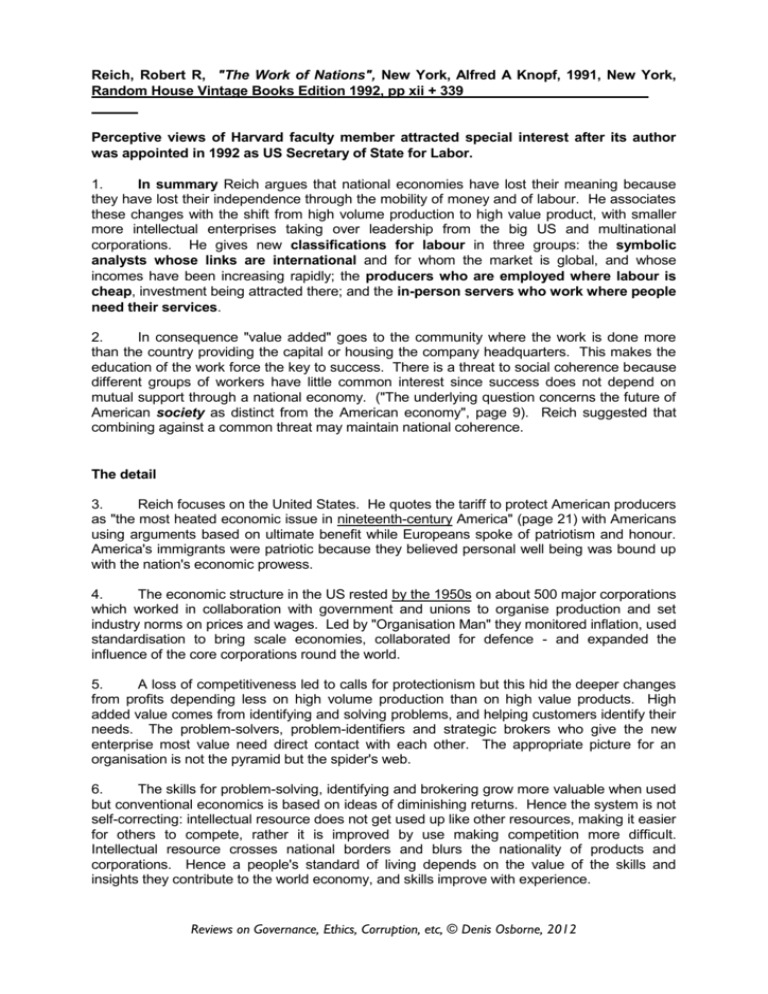
Reich, Robert R, "The Work of Nations", New York, Alfred A Knopf, 1991, New York, Random House Vintage Books Edition 1992, pp xii + 339 Perceptive views of Harvard faculty member attracted special interest after its author was appointed in 1992 as US Secretary of State for Labor. 1. In summary Reich argues that national economies have lost their meaning because they have lost their independence through the mobility of money and of labour. He associates these changes with the shift from high volume production to high value product, with smaller more intellectual enterprises taking over leadership from the big US and multinational corporations. He gives new classifications for labour in three groups: the symbolic analysts whose links are international and for whom the market is global, and whose incomes have been increasing rapidly; the producers who are employed where labour is cheap, investment being attracted there; and the in-person servers who work where people need their services. 2. In consequence "value added" goes to the community where the work is done more than the country providing the capital or housing the company headquarters. This makes the education of the work force the key to success. There is a threat to social coherence because different groups of workers have little common interest since success does not depend on mutual support through a national economy. ("The underlying question concerns the future of American society as distinct from the American economy", page 9). Reich suggested that combining against a common threat may maintain national coherence. The detail 3. Reich focuses on the United States. He quotes the tariff to protect American producers as "the most heated economic issue in nineteenth-century America" (page 21) with Americans using arguments based on ultimate benefit while Europeans spoke of patriotism and honour. America's immigrants were patriotic because they believed personal well being was bound up with the nation's economic prowess. 4. The economic structure in the US rested by the 1950s on about 500 major corporations which worked in collaboration with government and unions to organise production and set industry norms on prices and wages. Led by "Organisation Man" they monitored inflation, used standardisation to bring scale economies, collaborated for defence - and expanded the influence of the core corporations round the world. 5. A loss of competitiveness led to calls for protectionism but this hid the deeper changes from profits depending less on high volume production than on high value products. High added value comes from identifying and solving problems, and helping customers identify their needs. The problem-solvers, problem-identifiers and strategic brokers who give the new enterprise most value need direct contact with each other. The appropriate picture for an organisation is not the pyramid but the spider's web. 6. The skills for problem-solving, identifying and brokering grow more valuable when used but conventional economics is based on ideas of diminishing returns. Hence the system is not self-correcting: intellectual resource does not get used up like other resources, making it easier for others to compete, rather it is improved by use making competition more difficult. Intellectual resource crosses national borders and blurs the nationality of products and corporations. Hence a people's standard of living depends on the value of the skills and insights they contribute to the world economy, and skills improve with experience. Reviews on Governance, Ethics, Corruption, etc, © Denis Osborne, 2012 7. The three categories of jobs of the future do not match those in the official statistics of the early 1990s. They are: routine producers (repetitive tasks including data processing), inperson servers (taxi-drivers, secretaries, waitresses, retail sales workers etc, again undertaking mostly repetitive work) and symbolic-analysts (as above, with Reich estimating their growth from 8% of American jobs in the 1950s to 20% now). The supply of symbolic-analytic services creates its own demand because they tell clients what they need and then fulfil the need. Reich criticises lawyers and financial advisers for doing that too well! 8. It is the jobs people do rather than the successes of corporations and national economies that determine the standard of living. American incomes have become more inequitable since around 1977, after years in which they grew closer together. Routine producers are getting poorer, and in-person servers also poorer though with some variations. But symbolic analysts succeed. Differences in education between rich and poor accentuate the difference between those whose education fits them to become symbolic analysts and the rest, the symbolic analyst requiring the four basic skills of abstraction, system thinking, experimentation and collaboration. Those skills facilitate networking, defined by Reich as "the studied process of knowing what is happening and simultaneously making oneself known". Symbolic analysts need brains and quick access to the rest of the world. 9. The divide between types of labour divides the nation, accentuated by vestigial thoughts on national economies and national wealth. Devolution exacerbates differences between the parts in schooling, security, etc (implicit from descriptions of US on p 272). Reich sees the rich seceding from "national" society and argues that the choice need not lie between zero-sum nationalism (as Reich calls it) and impassive cosmopolitanism because there is an option of "positive economic nationalism" in which efforts are made to benefit all categories of worker. One need is to attract investment. In this as in other matters Reich does not favour unrestrained competition. He sees cities and nations bidding for global jobs by offering subsidies and tax breaks (“bribes”) and facing threats to remove factories unless inducements are given to remain. See “Extortion”; p 297. Footnote shows how competing bids in the US led to a $700 m fee to televise the 1992 Olympics compared with $70 m in Europe, which bid as a whole. He argues for an agreement about investment to "ensure against zero-sum ploys in which nations bid against one another to attract the same set of global firms and related technologies" and to bar "threats to close the domestic market unless certain investments were undertaken". 10. Third world development brings mutual benefit, but Reich's argument is that we need to "assert that our mutual obligations as citizens extend beyond our economic usefulness to one another, and act accordingly". Reich thinks national identity is often served by coming together against a common threat, and asks whether Americans will create a new enemy from Japan’s economic challenge. Comment 11. I think this a splendid book: Reich writes well and makes his points with lively examples and illustrations. I agree with its main thrusts though I think Reich, despite his protestations, still focuses too much on economic issues at the expense of the social. The symbolic analysts who value their work too highly may be unsettled by political rather than economic changes. Moreover Reich omits to mention the in-person servers who share many characteristics with symbolic analysts - doctors, teachers and others in the traditional "professional classes". That omission may indicate an important flaw in Reich's reasoning. The link they retain between different categories of worker brings a cohesion of place and belonging to a locality even for those whose work is "global". Part of this may be an ethnic "coming together against the Other" but the Other is perceived in terms different from class and wealth. Reviews on Governance, Ethics, Corruption, etc, © Denis Osborne, 2012 12. Though Reich mentions the impact of global flows of information and money he does not do justice to the importance of technology in bringing changes to society and patterns of employment. Some details are less convincing than the general thrust of the book. Thus Reich sees increasing regional disparities as the rich get richer. Some fascinating illustrations and quotations… "In 1984, 80 percent of the cost of a computer was in its hardware, 20 percent in software; by 1990, the proportions were just the reverse." Page 83. A Finnish paper company sold tree-harvesting machines to the machine operators and gave them contracts for the work. Productivity soared as operators kept the machines in better condition and used them with greater care. Footnote page 91. For the US, contrasting 1980s with the 1950s, "Most of the new jobs in the economy appear to come from small businesses, as does most of the growth in research spending. A similar transformation has been occurring in other nations." Page 95. In 1920 85% of cost of automobile went to labourers and investors. Today 5% of price of a semiconductor chip goes to owners of equipment and facilities, 6% to routine labour, over 85% for design, engineering services, patents, etc. Page 104. ".. governments successfully block .. at borders .. few things other than tangible objects weighing more than three hundred pounds." Page 111. "Until the 1990s each generation of Americans had been better educated than the generation preceding it... But by 1990 younger men were less educated than the generation before... Younger women were becoming slightly better educated." Footnote on page 258, using data from American Higher Education Research Program, American Council on Education, 1989. Finally A job likely to be inhabited by a symbolic analyst may be found, according to Reich (page 183), by joining together one word from each of the three columns below: Communications Management Engineer Systems Planning Director Financial Process Designer Creative Development Co-ordinator Project Strategy Consultant Business Policy Manager Resource Applications Adviser Product Research Planner Reviews on Governance, Ethics, Corruption, etc, © Denis Osborne, 2012
